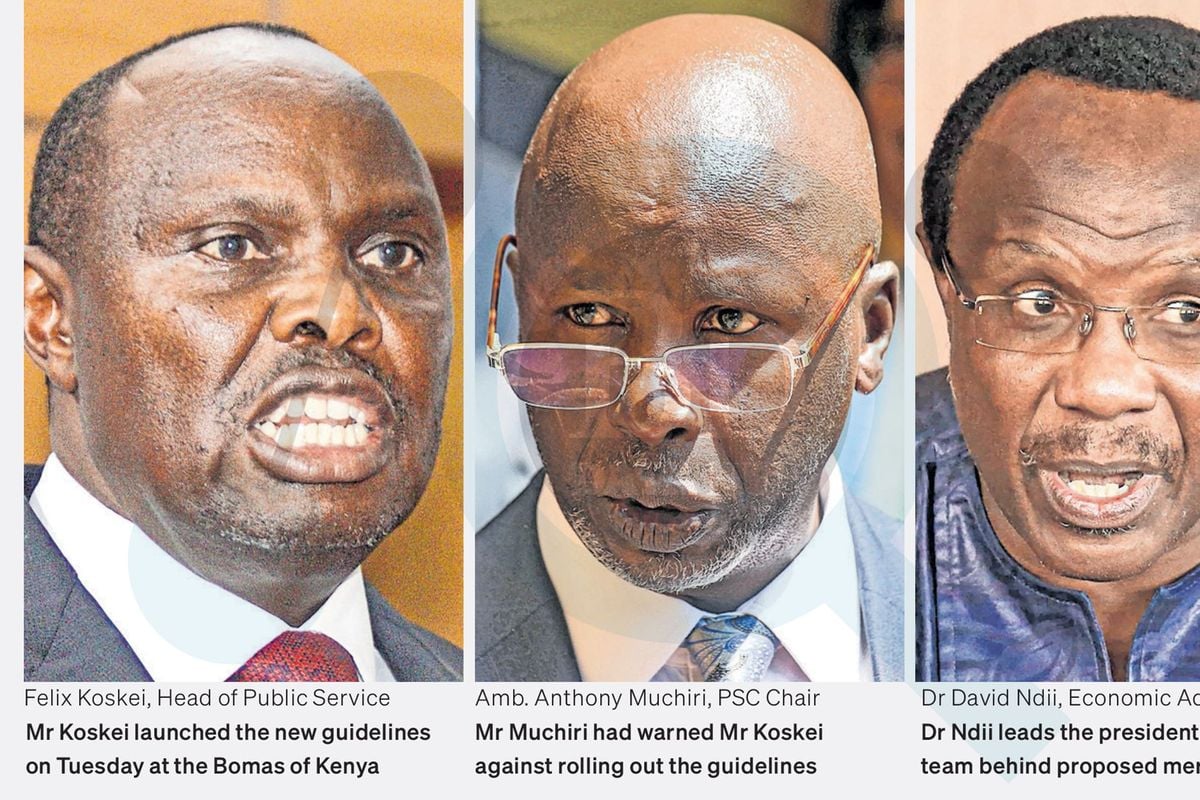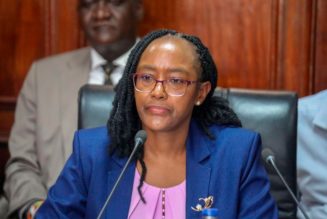
The Public Service Commission (PSC) has told off the Executive Office of the President over new guidelines on the management of parastatals, pointing to a simmering struggle over control of the State-owned entities that manage billions of shillings.
PSC chairperson Anthony Muchiri has termed Executive Order No. 3 of 2024 on Guidelines for the Management of State Corporations as illegal and unconstitutional for excluding the commission from their formulation.
The executive order gazetted by President William Ruto on May 24 provides for, among others, terms and conditions of service for boards and human resource management of State corporations.
Dr Ruto directed that the new guidelines “shall and do supersede the Guidelines issued in November 2004”.
State House’s Chief of Staff & Head of the Public Service Felix Koskei launched the guidelines on Tuesday at Bomas of Kenya at a meeting attended by chairpersons and CEOs of State Corporations, vice chancellors of public universities, and other government agencies.
The Business Daily has, however, established that Mr Muchiri had warned Mr Koskei against rolling out the guidelines, insisting that State corporations and public universities were part of public service and that their management is constitutionally under the PSC.
“The Guidelines are in conflict with the provisions of the Constitution and are, therefore, invalid pursuant to the provisions of Article 2(4) of the Constitution…,” Mr Muchiri wrote in a letter to Mr Koskei on May 28.
“The guidelines violate several court decisions that found that it is only the Commission (PSC) that has the power to establish offices and approve human resource instruments in the public service.”
Article 2(4) provides that “any law, including customary law, that is inconsistent with the Constitution is void to the extent of the inconsistency, and any act or omission in contravention of this Constitution is invalid”.
The PSC says the authors of the Guidelines relied on and made reference to Sections 5(3) and 27 of the State Corporations Act which have both “been found to be unconstitutional for violating the constitutional mandate of the Commission as provided in Article 234 of the Constitution”.
Article 234 gives the PSC powers over the functioning of public service entities, excluding those for State officers, Ambassadors, High Commissioners and consular representatives. Other offices where the PSC has no powers are those under the Parliamentary Service Commission, Judicial Service Commission, Teachers Service Commission, National Service Commission and County Public Service.
“State Corporations and public universities are part of the public service,” Mr Muchiri says.
“This is an issue that has been litigated and determined by courts several times, including in a most recent Court of Appeal decision on April 27, 2024, in … Civil Appeal No 156 of 2016 between Salaries and Remuneration Commission and National Hospital [sic] Insurance Fund and two others.”
The gazettement of the revised guidelines for the management of parastatals was preceded by a Cabinet resolution of April 23 that followed a directive by Dr Ruto on fiscal consolidation and management of State corporations.
“The new policy also aligns the determination of the terms and conditions of service in the agencies with the provisions of the Constitution and the relevant laws,” a dispatch from the Ruto-chaired Cabinet read in part. “Consequently, the revised guidelines will provide salary bands and allowances for CEOs, board members, Vice-Chancellors, Chancellors and members of university councils.”
The Cabinet further resolved that the Salaries and Remunerations Commission and the State Corporations Advisory Committee will be key players in determining the terms and conditions for State corporations.
“The Commission was not consulted during the generation of the guidelines. It is recommended that a stakeholder meeting be urgently constituted to address the constitutional and legal implications highlighted in the instant advisory,” Mr Muchiri says in the letter.
Earlier on March 26, Dr Ruto met the chairperson and chief executives where he directed them to cut their recurrent budgets for the year starting July by at least a third.
“We will shut them [loss-making State corporations] down, we will get their employees to go and work somewhere else and at least we will stop making the losses,” Dr Ruto warned.
“And I want some of those institutions to volunteer [to close down]. Some of them should start telling us,’ Please close our institutions and assign us other jobs’ so that Kenyans stop losing money.”
A day later on March 27, the Treasury issued a circular that made it clear that entities identified for mergers and winding up will get minimal budgetary allocation for the year starting July.
The financial risks associated with struggling parastatals amounted to Sh1.24 trillion by the end of the last financial year in June 2023.
These include Sh145.4 billion in guaranteed loans, Sh111.80 billion in non-guaranteed loans and Sh983.20 billion on-lent loans.









